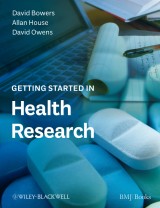Details

Getting Started in Health Research
1. Aufl.
|
44,99 € |
|
| Verlag: | Wiley |
| Format: | EPUB |
| Veröffentl.: | 15.11.2011 |
| ISBN/EAN: | 9781118292969 |
| Sprache: | englisch |
| Anzahl Seiten: | 192 |
DRM-geschütztes eBook, Sie benötigen z.B. Adobe Digital Editions und eine Adobe ID zum Lesen.
Beschreibungen
<b>By the time you've read this book, you'll be ready to design your own research project</b> <p>Not everyone in clinical research is a scientific investigator. In fact, a large proportion of health professionals undertaking a research project are working in clinical care, as junior doctors, nurses or allied health professionals. For them a book that begins with the basics of study design and takes them through all the stages to data collection, analysis, and submission for publication is vital. <i>Getting Started in Health Research</i> is the answer. It provides fundamental information on:</p> <ul type="disc"> <li>Framing the research question</li> <li>Performing the literature search</li> <li>Choosing the study design</li> <li>Collecting data</li> <li>Getting funding</li> <li>Recruiting participants</li> <li>Writing your paper</li> </ul> <p>Lively case studies provide a continuous narrative, addressing the pitfalls and problems that can occur.</p> <p>Calling upon their vast experience of teaching health research methodology, these authors have turned a seemingly daunting task into a challenging and enjoyable prospect.</p> <p><b><i>The companion of Understanding Clinical Papers </i></b><a href="http://www.wiley.com/go/"></a><a href="http://www.wiley.com/buy/9780470091302">www.wiley.com/buy/</a>9780470091302</p> <p><b>Reviews of <i>Understanding Clinical Papers</i></b></p> <p>"...an excellent basis for all who intend to write scientific texts as well as those reading, evaluating, and trying to understand the results..."<br /> <b><i>Clinical Chemistry</i>, May 2007</b></p> <p>"What makes this book unique is that each point presented is illustrated with excerpts from actual papers, often three or four per chapter...this is a very effective teaching device."<br /> <b><i>Journal of the American Medical Association</i>, December 26, 2006</b></p> <p>"What strikes the reader ... straight away is clarity ... promises to become a recommended text for undergraduate and postgraduate courses."<br /> <b><i>Journal of Tropical Pediatrics</i>, September 2006</b></p> <p>"This book should be an essential addition to the personal libraries of all health care workers . . . "<br /> <b><i>Oncology</i>, 2002</b></p>
Preface. <p><b>PART I LIMBERING UP.</b></p> <p>1 Turning Your General Aim Into a Specific Question.</p> <p>2 Taking a Preliminary Look at What Has Already Been Done.</p> <p><b>PART II ON YOUR MARKS.</b></p> <p>3 Coming Up With an Initial Plan of Action.</p> <p>4 Carrying Out a Systematic Search.</p> <p>5 Building a Team.</p> <p><b>PART III GET SET.</b></p> <p>6 Choosing the Best Study Design.</p> <p>7 Selecting Samples for Quantitative Research.</p> <p>8 Selecting Samples for Qualitative Research.</p> <p><b>PART IV WAIT FOR IT.</b></p> <p>9 Deciding What Information to Collect.</p> <p>10 Tackling Confounders.</p> <p>11 How Many People to Study?</p> <p>12 Getting Ready for a Qualitative Analysis.</p> <p>13 Getting Ready for a Quantitative Analysis.</p> <p>14 Writing Your Final Protocol.</p> <p>15 Arranging Funding.</p> <p>16 Getting Permission to Go Ahead.</p> <p><b>PART V GO!</b></p> <p>17 Recruiting the Participants.</p> <p>18 Collecting and Recording the Data.</p> <p>19 Living With (and Without) the Data.</p> <p><b>PART VI STAYING THE COURSE.</b></p> <p>20 Taking Stock.</p> <p>21 Making Sense of Your Results – the Quantitative Case.</p> <p>22 Making Sense of Your Results – the Qualitative Case.</p> <p><b>PART VII THE FINISHING LINE.</b></p> <p>23 Writing a Research Paper.</p> <p>24 Setting Out Your Findings.</p> <p>25 Writing Your Discussion.</p> <p>26 Writing a Thesis or Other Report.</p> <p>27 Dealing With Journals.</p> <p>Further Reading.</p> <p>Index.</p>
"The purpose is to provide basic information for conducting a research project. This is a worthwhile objective, since many healthcare professionals who may not have a background in research have questions that need answers ... This will be a good guide as a starting point for conducting research." (Doody's, 20 January 2012) <p>"This is a well-intentioned introduction to health research." (British Journal of Cardiology, 2011)</p> <p>"This book will appeal to students in all branches of the health profession and is warmly recommended." (Journal of Tropical Pediatrics, 2011)</p> <p> </p>
<b>David Bowers</b>, Medical Statistician, University of Leeds Medical School<br /><b>Allan House</b>, Professor of Liaison Psychiatry, Leeds Institute of Health Science, University of Leeds<br /><b>David Owens</b>, Senior Lecturer in Psychiatry, Leeds Institute of Health Science, University of Leeds
<b>By the time you've read this book, you'll be ready to design your own research project</b> <p>Not everyone in clinical research is a scientific investigator. In fact, a large proportion of health professionals undertaking a research project are working in clinical care, as junior doctors, nurses or allied health professionals. For them a book that begins with the basics of study design and takes them through all the stages to data collection, analysis, and submission for publication is vital. <i>Getting Started in Health Research</i> is the answer. It provides fundamental information on:</p> <ul type="disc"> <li>Framing the research question</li> <li>Performing the literature search</li> <li>Choosing the study design</li> <li>Collecting data</li> <li>Getting funding</li> <li>Recruiting participants</li> <li>Writing your paper</li> </ul> <p>Lively case studies provide a continuous narrative, addressing the pitfalls and problems that can occur.</p> <p>Calling upon their vast experience of teaching health research methodology, these authors have turned a seemingly daunting task into a challenging and enjoyable prospect.</p> <p><b>Titles of Related Interest</b></p> <p><i>Understanding Clinical Papers, 2nd Edition</i><br /> David Bowers, Allan House, David Owens<br /> SBN: 978-0-470-09130-2</p> <p><b>Reviews of <i>Understanding Clinical Papers</i></b></p> <p>"...an excellent basis for all who intend to write scientific texts as well as those reading, evaluating, and trying to understand the results..."<br /> –<b><i>Clinical Chemistry</i>, May 2007</b></p> <p>"What makes this book unique is that each point presented is illustrated with excerpts from actual papers, often three or four per chapter...this is a very effective teaching device."<br /> –<b><i>Journal of the American Medical Association</i>, December 26, 2006</b></p> <p>"What strikes the reader... straight away is clarity ... promises to become a recommended text for undergraduate and postgraduate courses."<br /> –<b><i>Journal of Tropical Pediatrics</i>, September 2006</b><br /> <br /> "This book should be an essential addition to the personal libraries of all health care workers . . ."<br /> –<b><i>Oncology</i> 2002</b></p>


















